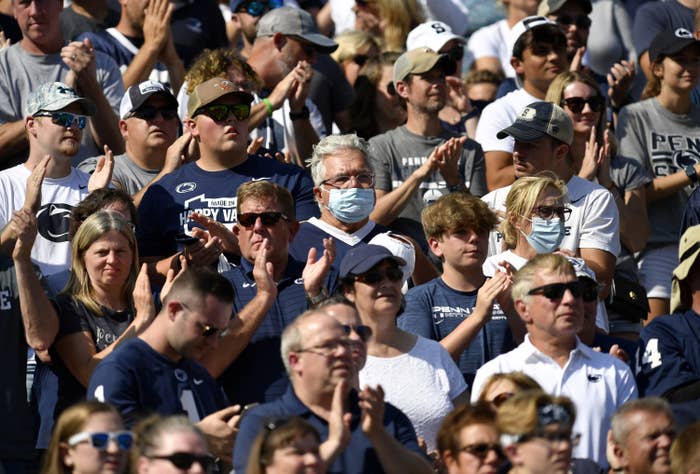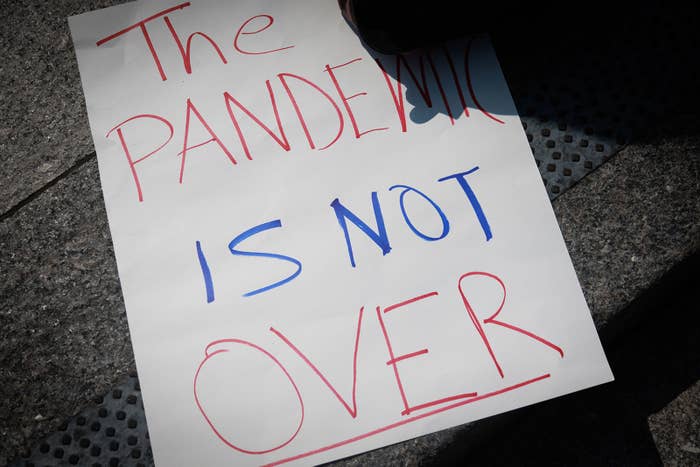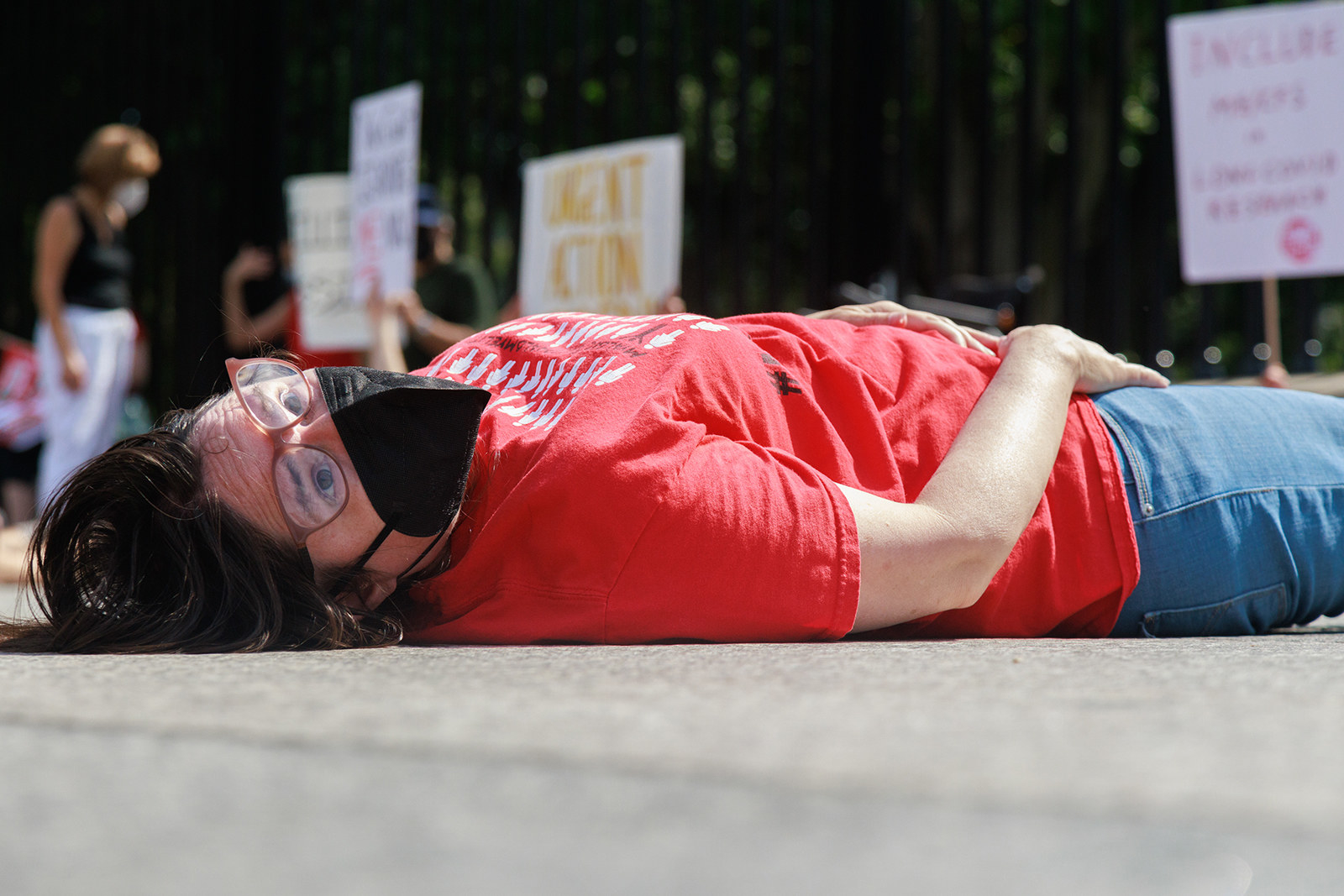
We all want the pandemic to be over, but that desire alone isn’t enough to make it happen. President Joe Biden’s latest remarks, however, are stirring the pot, concerning and frustrating a ton of public health experts who’ve worked tirelessly to remind everyone that COVID is still here and likely won’t leave.
“The pandemic is over. We still have a problem with COVID. We’re still doing a lot of work on it. But the pandemic is over,” Biden said during a 60 Minutes interview on Sunday as he toured the Detroit Auto Show. “If you notice no one is wearing masks, everybody seems to be in pretty good shape. And so I think it’s changing, and I think this is the perfect example of it.”
Biden is right. Things are changing, and the US is in a much different — and better — place than it was at the start of the pandemic. We now have three effective COVID vaccines and several lifesaving treatments, for example. But we’re also still experiencing an average of 360 deaths from the disease every day; nearly 1 in 5 adults in the US who have had the virus have debilitating long COVID; and less than 70% of Americans are fully vaccinated, meaning a large portion of the country remains vulnerable to severe disease if infected.

“The problem with Biden’s message is that it doubles down on this idea that we don’t really need to worry about COVID anymore,” which in a way maintains that the current magnitude of infections, death, and disability as a result of the disease is normal or OK, said Dr. Emily Landon, a University of Chicago infectious disease expert. “That messaging discourages people from keeping their vigilance up; it discourages people from putting on a mask in a high-risk situation; and it discourages people from getting those really essential boosters.”
What’s more, the US, including its president, doesn’t get to say when the pandemic ends. It’s traditionally up to the World Health Organization to decide that on behalf of the entire globe. (The head of the group recently said that COVID’s “end is in sight.”) Still, there aren’t clear parameters to judge that decision, such as a specific global death or case rate. And when that decision is eventually made, it won’t necessarily reflect individual feelings or lingering struggles with COVID.
Who decides when a pandemic is over? What we are seeing is a struggle for health equity. Those who are most vulnerable— who, when the next variant strikes, are at highest risk of ending up dead or disabled— are demanding more be done to stop transmission. Stand with them.
Overall, Biden’s message was insensitive, Landon said, and ignores those most vulnerable to COVID, including older adults, immunocompromised people, and people of color who are disproportionately affected by the disease and its residual impacts on work, childcare, and more.
Even if we’re past the worst of it, “there’s still more to come,” Landon said, because “whether or not the pandemic part of this is over is irrelevant. COVID is here to stay” — and that could mean new variants that are better at dodging our defenses set up by infection and vaccination.
Perhaps one of the main reasons we’re not quite out of the woods is that we haven’t done enough to address the damage caused by COVID or prevent the next pandemic from happening, Landon said.
“It’s like a hurricane. When the winds come, you focus on getting through that first, but then after it passes, that’s when we put all of our time and effort into cleaning up and getting communities back to a place where they can function,” Landon said. “I think that’s where we are with COVID; the storm isn’t over.”
In an ideal scenario, the US should install efficient ventilation systems in schools and other locations, as well as offer support to families whose loved ones died from COVID, which hasn’t been done on a national scale.
Don’t ask “Is the pandemic over?” Ask whether there is still preventable suffering.
“We need to do harm reduction for the future, and we need to start repairing and acknowledging some of the damages that have happened,” Landon said. “Doing things to fix those problems would go a long way toward helping Americans be able to stomach moving forward in the midst of having more COVID problems to come.”
Ideally, we should have a system in place to deal with COVID much as we do for influenza. Public health experts promote flu shot vaccination campaigns each year, which scientists update annually to reflect the latest variant. Hospital systems also make changes to their masking, isolation, and case tracking policies, Landon said. In general, there’s an understanding of how the flu behaves, who’s most at risk, and what tools are needed to protect the vulnerable.
When it comes to COVID, states and cities use different metrics to inform their infection control measures, which is confusing and unhelpful. COVID also doesn’t have the predictable pattern seen with influenza, which gives us a defined flu season. Until we do — if that time ever comes — the US cannot confidently exit pandemic territory, Landon said.

All in all, the pandemic is “more complicated than just one sentence can get across,” Landon said of Biden’s recent comment, but it’s no excuse to oversimplify where the US stands in its fight against it.
“I really don’t think that people are quite as fatigued by the pandemic as they are of change,” Landon said. “And while there’s still going to be some change to come, I think we have to do what we can to soothe and ameliorate the changes by avoiding saying things like the pandemic is over, which just creates whiplash.”
In the meantime, it’s smart to avoid getting COVID as much as possible, Landon said, which will reduce your risks of developing long COVID. She also recommends getting vaccinated and wearing a mask when appropriate.
“If you’re lucky enough to have health and not have to worry about getting COVID,” try putting yourself in the position of others who may not be so fortunate, Landon said. “The golden rule is really important here: Treat others the way you would want to be treated.”
